Escapism or realism, away or into — Polar definitions, yet perhaps describing the same thing. Somewhere there starts the debate on how to reach this most sought after thing. Since I first saw Michael Radford’s Il Postino, I’ve felt the awakening of the main character speak to me. The poor fisherman’s middle-aged son of a quiet Italian village meets the exiled Chilean poet Pablo Neruda. The laconic and simple man suddenly finds his existence, his meaning of life, his freedom, in poetry. Yes, you’ve probably seen it and cried bittersweet tears to Luis Bacalov’s I Suoni dell’isola, just as I did, and still do. I was twenty-five when Massimo Troisi first dug into my heart. I was deeply immersed in a career as Art Director in the booming IT-sector and had decided to set life on hold. Massimo, with his dying words, guided me into another path, another realm. I was never to be the same. It was one of those things, amongst books and experiences while traveling, that had me awakened, finding myself in the great and incomprehensible nothingness. Half a life later, living around the world, adapting to new cultures and ways of life, a troublesome divorce happened. In a hasty decision to leave everything behind and run after my two daughters that had been taken away from me by my ex, an existentialistic journey in a minimal campervan began. Writing a diary it somehow ended up in my debut novel – The Swede who let go. A floodgate opened, I couldn’t stop writing. Five years and seven books later, with the troubles of my daughters’ behind me, I’m still a rolling stone, and since many years absolutely sure I’m at the outer barrier, as close to the very thing a human can get. A book on the topic is about half written so far, my try to explain the inexplicable. There are a few books that have inspired me on the way, or should I say discouraged me. I would love to delve deep into Swedish literature here, with a language and national temperament formed by cold and dark into philosophical reasoning. No, I am not referring to the boom in whodunit that has gone too far, if you ask me. A French friend asked me worryingly why Swedes seem so fascinated by psychopathic murderers. No, we have to step a generation or two back in time, when Sweden was still Sweden, like the incorrigible Fritiof Nilsson Piraten, Sweden’s Mark Twain, or perhaps the literary peak August Strindberg and his stories on societal entrapment. And I absolutely have to mention Vilhelm Moberg and his tetralogy about the exodus of Swedes emigrating to America in the beginning of the 20th century, to the point on the search for freedom. Etcetera etcetera. More internationally acclaimed is perhaps our Danish neighbor, especially Søren Kierkegaard, and even if almost two hundred years ago a good example on how Scandinavians contemplate on this issue. It would be a formidable task to let you in on Swedish, non-translated literature. Let’s settle with English. I’m almost sure my reader list will take you by surprise, not being about freedom per say, more on what it isn’t. As freedom is a fathomless thing, it’s best to awaken in one’s own stride and direction, not being told what it is or how to reach it. Yes, say the lover of Nietzsche and Wittgenstein knowingly, this is the very question that one should refrain from asking. Oh, and may I shout out to Nina Simone. Rising my voice to reach over to the other side, — I love you! … And you too Sophie Roell (Fivebooks) for helping me with the posting.
1
This is a collection of Harold Pinter's prose, poems and political writing, spanning over his whole career. The latest edition also has an interview reflecting on his time as evacuee in Cornwall during the WW2. One of many inspiring and provoking reads is his Nobel Prize Acceptance Speech that had many choke on the Champagne. It was a frightening awakening for most hearing him talk about evil as an omnipresent strategy for power, that we are as bad as them. "There is no hard distinction between what is real and what is unreal, nor what is true or false; it can be both true and false." This is how, where and when freedom is taken away from us, casting the blame instead of dealing with our own colonialism, entrapping ourselves behind thickening walls. A lot is to be learned from his typical writing style. Strings of unpredictable thoughts tied together as stochastic as life itself, one thing leads into another, not even himself sure about the purpose or end result while writing. It's liberating the reader to interpret and feel the text, instead of judging.
2
Also titled; Gonzo Papers Vol. 1. It's a collection of Hunter's essays, from his early years up into the rise of Gonzo Journalism and onto 1979 when it first was published. There are few laws of gravity that apply here, it's best to just flow with the energy and enjoy the many spot-on comments and phrases, as much as getting frightened and discouraged to venture too far oneself. Hunter was a true trailblazer and took the consequences, copying his idol Ernest Hemingway on how to put an end to it all. In this collection he is very much alive though, cutting with a sharp knife at his most outrageous and vivid, cutting your preconceptions into pulp, in the very best sense.
3
Huxley or Orwell? I believe Neil Postman's comparison to be true, and looking over my shoulder I too must state Aldous' prediction to be painfully accurate. If we are to survive current tumultuous times, absolutely if we strive for freedom in any form or shape, we all have to read, and keep in mind, this scary prophecy.
4
Don't judge others by your own standards, you might be the fascist. Seeing the whole picture, understanding how to filter your own concepts and ideas, it all starts by understanding fascism and oppression — the polar opposite of freedom. The elitist belief that We know better than Them never ends happily. Umberto builds his ladder of thoughts on his childhood experiences of Mussolini's Italian regime, creating an easy to understand picture of what's happening today with Woke, PC, the Cancel Culture, and political structures many see as the good side, referring back to Harold Pinter. Umberto has a delicate but still straightforward writing style, famous for embroidering academic text giving them a narrative quality. It's amusing and entertaining to read him, and a bit Hemingway'ish in the sense that he's not showboating a vast vocabulary but using it with surgical precision. Anyone could find inspiration in his works, perhaps especially those who think they already know it all, and at these times.
5
This man and his research on Human Decision Processes should have been put first. I don't know how many I have asked, saying they've kind of read it, but never finished it or not really remember the big thing. This book, and all of the other of Daniel's books on the subject, was a positive opening of a Pandora's Box for me personally. With it I can understand misunderstandings, so to speak, and it has been an important tool in my reasoning.
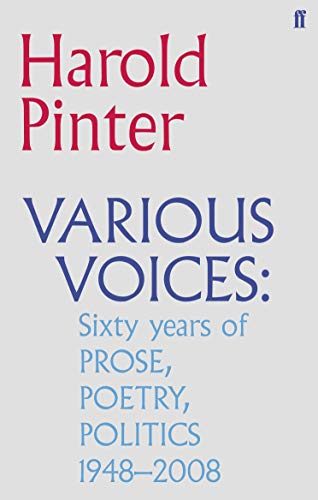
1
This is a collection of Harold Pinter's prose, poems and political writing, spanning over his whole career. The latest edition also has an interview reflecting on his time as evacuee in Cornwall during the WW2. One of many inspiring and provoking reads is his Nobel Prize Acceptance Speech that had many choke on the Champagne. It was a frightening awakening for most hearing him talk about evil as an omnipresent strategy for power, that we are as bad as them. "There is no hard distinction between what is real and what is unreal, nor what is true or false; it can be both true and false." This is how, where and when freedom is taken away from us, casting the blame instead of dealing with our own colonialism, entrapping ourselves behind thickening walls. A lot is to be learned from his typical writing style. Strings of unpredictable thoughts tied together as stochastic as life itself, one thing leads into another, not even himself sure about the purpose or end result while writing. It's liberating the reader to interpret and feel the text, instead of judging.
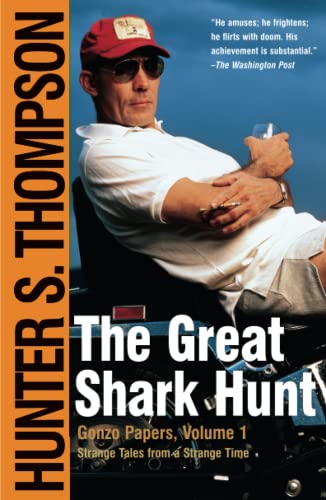
2
Also titled; Gonzo Papers Vol. 1. It's a collection of Hunter's essays, from his early years up into the rise of Gonzo Journalism and onto 1979 when it first was published. There are few laws of gravity that apply here, it's best to just flow with the energy and enjoy the many spot-on comments and phrases, as much as getting frightened and discouraged to venture too far oneself. Hunter was a true trailblazer and took the consequences, copying his idol Ernest Hemingway on how to put an end to it all. In this collection he is very much alive though, cutting with a sharp knife at his most outrageous and vivid, cutting your preconceptions into pulp, in the very best sense.
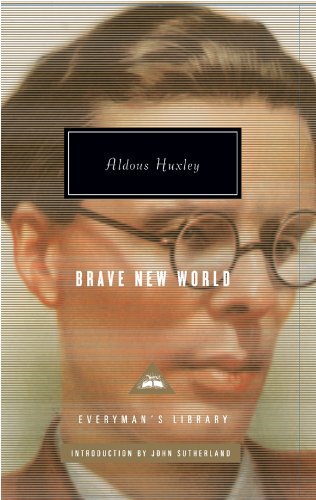
3
Huxley or Orwell? I believe Neil Postman's comparison to be true, and looking over my shoulder I too must state Aldous' prediction to be painfully accurate. If we are to survive current tumultuous times, absolutely if we strive for freedom in any form or shape, we all have to read, and keep in mind, this scary prophecy.
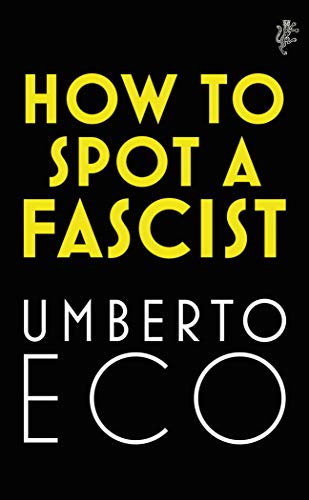
4
Don't judge others by your own standards, you might be the fascist. Seeing the whole picture, understanding how to filter your own concepts and ideas, it all starts by understanding fascism and oppression — the polar opposite of freedom. The elitist belief that We know better than Them never ends happily. Umberto builds his ladder of thoughts on his childhood experiences of Mussolini's Italian regime, creating an easy to understand picture of what's happening today with Woke, PC, the Cancel Culture, and political structures many see as the good side, referring back to Harold Pinter. Umberto has a delicate but still straightforward writing style, famous for embroidering academic text giving them a narrative quality. It's amusing and entertaining to read him, and a bit Hemingway'ish in the sense that he's not showboating a vast vocabulary but using it with surgical precision. Anyone could find inspiration in his works, perhaps especially those who think they already know it all, and at these times.
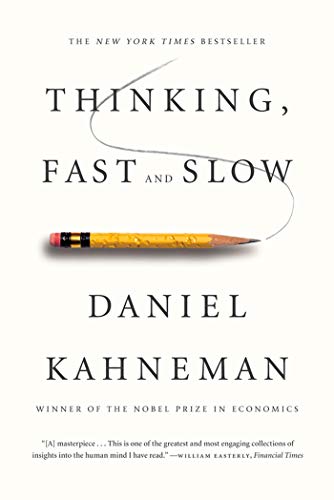
5
This man and his research on Human Decision Processes should have been put first. I don't know how many I have asked, saying they've kind of read it, but never finished it or not really remember the big thing. This book, and all of the other of Daniel's books on the subject, was a positive opening of a Pandora's Box for me personally. With it I can understand misunderstandings, so to speak, and it has been an important tool in my reasoning.
© Five Books 2026